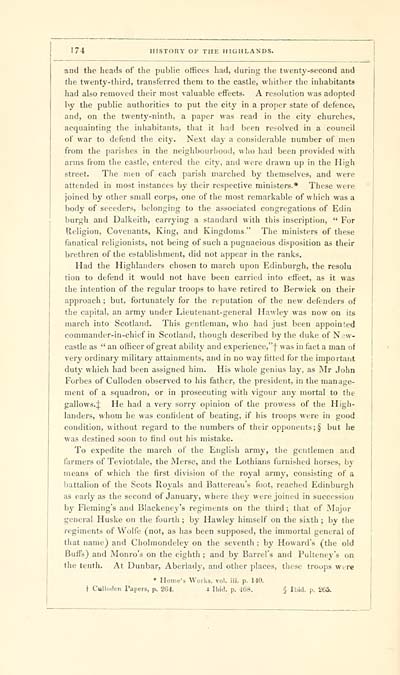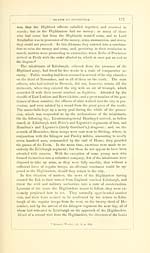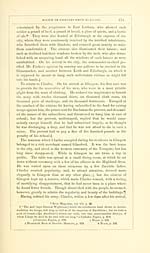Download files
Complete book:
Individual page:
Thumbnail gallery: Grid view | List view

174 HISTORY OF THE HIGHLANDS.
and the heads of the public offices Lad, during the twenty-second and
the twenty-third, transferred them to the castle, whither the inhabitants
had also removed their most valuable effects. A resolution was adopted
by the public authorities to put the city in a proper state of defence,
and, on the twentj'-ninth, a paper was read in the city churches,
acquainting the inliabitants, tliat it had been resolved in a council
of war to defend the city. Next day a considera1)Ie number of men
from the parishes in the neighbourhood, who had been provided with
arms from the castle, entered the city, and were drawn up in the High
street. The men of each parish marched by themselves, and were
attended in most instances by their respective ministers.* These were
joined by other small corps, one of the most remarkable of which was a
body of seeeders, belonging to the associated congregations of Edin
burgh and Dalkeith, carrying a standard with this inscription, " For
Religion, Covenants, King, and Kingdoms." The ministers of these
fanatical religionists, not being of such a pugnacious disposition as their
brethren of the establishment, did not appear in the ranks.
Had the Highlanders chosen to march upon Edinburgh, the resolu
tion to defend it would not have been carried into effect, as it was
the intention of the regular troops to have retired to Berwick on their
approach; but, fortunately for the riputation of the new defenders of
the capital, an army under Lieutenant-general Hawlej' was now on its
march into Scotland. This gentleman, who had just been appointed
commander-in-chief in Scotland, though described by the duke of New-
castle as " an officer of great ability and experience,"f was in fact a man of
very ordinary military attainments, and in no way fitted for the important
duty which had been assigned him. His whole genius lay, as Mr John
Forbes of CuUoden observed to his father, the president, in the manage-
ment of a squadron, or in prosecuting with vigour any mortal to the
gallows.:[: He had a very sorry opinion of the prowess of the High-
landers, whom he was confident of beating, if his troops were in good
condition, without regard to the numbers of tlieir opponents; § but he
was destined soon to find out his mistake.
To expedite the march of the English army, the gentlemen and
farmers of Teviotdale, the iNIerse, and the Lothians furnished horses, by
means of which the first division of the royal army, consisting of a
battalion of the Scots Royals and Battereau's foot, reached Edinburgh
as early as the second of Januarj', where they were joined in succession
by Fleming's and Biackeney's regiments on the third ; that of Major
general Huske on the fourth ; by Hawley himself on the sixth ; by the
regiments of Wolfe (not, as has been supposed, the immortal general of
that name) and Cholmondeley on the seventh ; by Howard's (the old
Buffs) and Monro's on the eighth ; and by Barrel's and Pulteney's on
the tenth. At Dunbar, Aberlady, and other places, these troops wi-re
• Home's Wurks, vol. iii. p. 1 in.
) Cullcxlcii Papers, p. 2G4. i Ibid. p. -lbs. § Ibiil. p. 266.
and the heads of the public offices Lad, during the twenty-second and
the twenty-third, transferred them to the castle, whither the inhabitants
had also removed their most valuable effects. A resolution was adopted
by the public authorities to put the city in a proper state of defence,
and, on the twentj'-ninth, a paper was read in the city churches,
acquainting the inliabitants, tliat it had been resolved in a council
of war to defend the city. Next day a considera1)Ie number of men
from the parishes in the neighbourhood, who had been provided with
arms from the castle, entered the city, and were drawn up in the High
street. The men of each parish marched by themselves, and were
attended in most instances by their respective ministers.* These were
joined by other small corps, one of the most remarkable of which was a
body of seeeders, belonging to the associated congregations of Edin
burgh and Dalkeith, carrying a standard with this inscription, " For
Religion, Covenants, King, and Kingdoms." The ministers of these
fanatical religionists, not being of such a pugnacious disposition as their
brethren of the establishment, did not appear in the ranks.
Had the Highlanders chosen to march upon Edinburgh, the resolu
tion to defend it would not have been carried into effect, as it was
the intention of the regular troops to have retired to Berwick on their
approach; but, fortunately for the riputation of the new defenders of
the capital, an army under Lieutenant-general Hawlej' was now on its
march into Scotland. This gentleman, who had just been appointed
commander-in-chief in Scotland, though described by the duke of New-
castle as " an officer of great ability and experience,"f was in fact a man of
very ordinary military attainments, and in no way fitted for the important
duty which had been assigned him. His whole genius lay, as Mr John
Forbes of CuUoden observed to his father, the president, in the manage-
ment of a squadron, or in prosecuting with vigour any mortal to the
gallows.:[: He had a very sorry opinion of the prowess of the High-
landers, whom he was confident of beating, if his troops were in good
condition, without regard to the numbers of tlieir opponents; § but he
was destined soon to find out his mistake.
To expedite the march of the English army, the gentlemen and
farmers of Teviotdale, the iNIerse, and the Lothians furnished horses, by
means of which the first division of the royal army, consisting of a
battalion of the Scots Royals and Battereau's foot, reached Edinburgh
as early as the second of Januarj', where they were joined in succession
by Fleming's and Biackeney's regiments on the third ; that of Major
general Huske on the fourth ; by Hawley himself on the sixth ; by the
regiments of Wolfe (not, as has been supposed, the immortal general of
that name) and Cholmondeley on the seventh ; by Howard's (the old
Buffs) and Monro's on the eighth ; and by Barrel's and Pulteney's on
the tenth. At Dunbar, Aberlady, and other places, these troops wi-re
• Home's Wurks, vol. iii. p. 1 in.
) Cullcxlcii Papers, p. 2G4. i Ibid. p. -lbs. § Ibiil. p. 266.
Set display mode to: Large image | Transcription
Images and transcriptions on this page, including medium image downloads, may be used under the Creative Commons Attribution 4.0 International Licence unless otherwise stated. ![]()
| Early Gaelic Book Collections > Ossian Collection > History of the Highlands and of the Highland clans > Volume 3 > (204) |
|---|
| Permanent URL | https://digital.nls.uk/79654870 |
|---|
| Description | Vol. III. |
|---|---|
| Shelfmark | Oss.249 |
| Attribution and copyright: |
|
| Description | Selected books from the Ossian Collection of 327 volumes, originally assembled by J. Norman Methven of Perth. Different editions and translations of James MacPherson's epic poem 'Ossian', some with a map of the 'Kingdom of Connor'. Also secondary material relating to Ossianic poetry and the Ossian controversy. |
|---|
| Description | Selected items from five 'Special and Named Printed Collections'. Includes books in Gaelic and other Celtic languages, works about the Gaels, their languages, literature, culture and history. |
|---|

